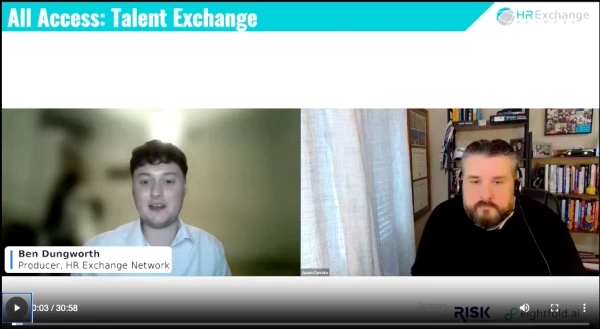Diversity and Inclusion: The business case
Add bookmarkThere is a hiring crisis in the United States. It has been previously reported there are currently approximately 7 million job openings, but there aren’t enough workers in America to fill those positions. Roughly 6.2-6.3 million people are looking for work.
During an interview with HR Exchange Network editor Mason Stevenson, SHRM President and HR Exchange Live: Future of Work speaker Johnny C. Taylor said that the answer to this crisis is diversity and inclusion. In fact, Taylor says there is a strong business case for hiring employees from diverse groups such as the formerly incarcerated.
“It’s simple math,” Taylor said. “I’ve seen estimates as high as 700,000 people a year are going to be released from incarceration in America. If that number is right, if you said half of them had sufficient skills or are otherwise qualified to work… if we put them to work it would go a long way to solving and closing that gap.”
In addition to that, Taylor it would also help companies maintain their competitiveness. Put simply, this particular group of workers is a class that business leaders simply can’t afford to overlook. SHRM, along with the Charles Koch Institute, conducted research into the value of hiring workers with a criminal background. They found:
- More than 82% of hiring managers in the nationally representative poll indicated workers with a criminal history are a high-quality hire equal to or even more effective than those without a criminal history.
- Similarly, 74% of those same hiring managers indicated extreme value in hiring those with a criminal history due to diminished costs associated with hiring from this population, as well as mitigating risk to effective operations.
- Hiring managers and HR professionals cited three effects on the larger ecosystem as benefits: the hiring of most-qualified candidates from a truly diverse pool, the intrinsic value of giving people second chances at employment, and the opportunity to improve the community around them.
Furthermore, Taylor said companies need to find new employees to, not only grow their business but most importantly, sustain them. He pointed to Walmart as an example. The company just announced they will pay semi tractor trailer drivers $90,000 per year as a way to bring in new talent. It also illustrates that trucking is, like many other industries, in real need of capable employees.
“They simply need people to drive these trucks. It does not require a PhD or an MBA from Harvard. They need someone who can get their CDL license and doesn’t have a DUI record. They can be put in the seat of a truck,” Taylor said. “These individuals are typically driving by themselves and aren’t going to cause harm to anyone.”
While the business case is very compelling, the reality is there are companies who don’t believe the formerly incarcerated are a legitimate source of potential candidates. From Taylor’s perspective, it’s just another dimension of diversity.
DOWNLOAD: HR Trends 2019
“Age. Race. Nation of origin. All diversity dimensions,” Taylor said. “If a third of Americans have a criminal record, you can make the case it’s another dimension of diversity.”
As a result, Taylor said this group is often the subject of unconscious bias that impacts all the other dimensions of diversity.
“The reality is this is one of the areas where discrimination in the hiring process is legal,” Taylor said. “You can say to someone ‘You are otherwise qualified, but you have a criminal record… so I’m not going to hire you.”
Taylor says HR is in a unique position to stop this from happening. According to SHRM, HR professionals can help do that by:
- Understanding the legal responsibilities and requirements of hiring a formerly incarcerated person.
- Applying “evidenced-based” best practices when hiring these workers.
- Understand how to develop and promote formerly incarcerated workers.
“As a country, we are making improvements to the justice system. It’s our time as business leaders to reframe the conversation around nontraditional talent pools and embrace those with criminal backgrounds as job candidates.”
At the end of the day, Taylor said hiring the formerly incarcerated and giving someone a second chance is the right thing to do. But’s it’s also important as companies continue to face the current recruiting situation.
“I’d much prefer to have someone out working, even if they’re making $25,000-$30,000 a year, than having them incarcerated costing me $25,000-$30,000 a year,” Taylor said.
Johnny C. Taylor, Jr. is the President of SHRM. He will be a panelist in a discussion on Diversity and Inclusion during HR Exchange LIVE, a free-to-attend online event for HR professionals. For more information and to register, click here.
NEXT: Women: Here Me Roar



















